HANDEL ISRAEL IN EGYPT

Monteverdi Choir
English Baroque Soloists
Peter Whelan — conductor


Monteverdi Choir
English Baroque Soloists
Peter Whelan — conductor
Monday 18 March 2024, 8pm
Palau de la Música, Barcelona, Spain
Wednesday 20 March 2024, 7:30pm Philharmonie, Luxembourg
Friday 22 March 2024, 7:30pm
St Martin-in-the-Fields, London, UK
Sunday 24 March 2024, 3pm
Chapelle Royale, Versailles, France
Tuesday 26 March 2024, 8pm
Elbphilharmonie, Hamburg, Germany
Sunday 21 July 2024, 6pm
Haus für Mozart, Salzburg Festival, Austria
Welcome to the church of St Martin-in-the-Fields, which was built just a decade and a half before Handel’s oratorio, Israel in Egypt, was first performed – down the road – at the King’s Theatre, Haymarket. The work was a flop at first but grew to immense popularity in the 19th century – a wax cylinder recording survives of several thousand singers performing part of the work in Crystal Palace in 1888. There’s nothing like it in Handel’s output in terms of the sustained demands on the choir: fugues and double fugues, declamatory choral recitative, expressive lamentation and fierce jubilation, the singers sometimes dividing into two choirs in antiphony or breaking away for duets and arias.
This concert was programmed long before the current war in Gaza began. That conflict, along with the war in Ukraine, brings into sharp focus the relevance of the work and highlights its universal themes. Israel in Egypt portrays a struggle for freedom that has been shared by many people, of different races, religions and creeds, throughout history and to the present day. It serves as a timely reminder, that in a shared world we must continue to stand up to discrimination and oppression.
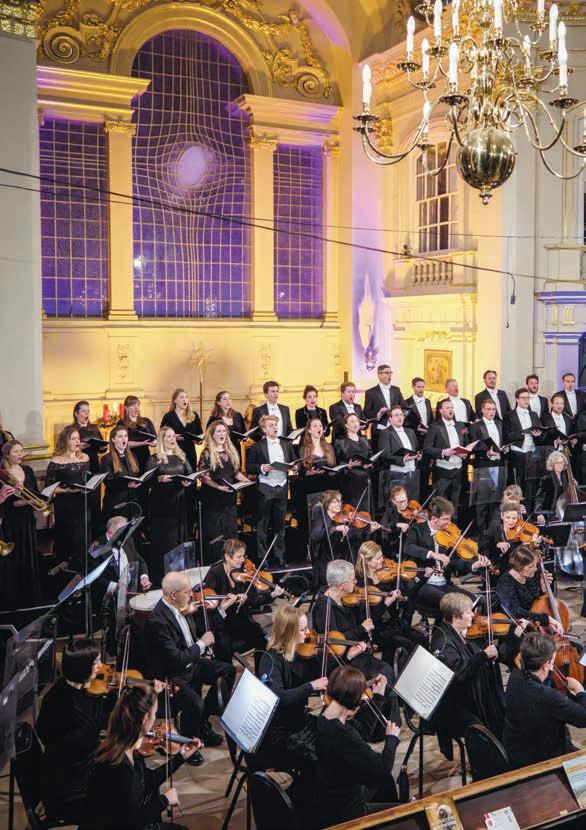
Monteverdi Choir & Orchestras presents
Monteverdi Choir
English Baroque Soloists
Peter Whelan conductor
Julia Doyle — soprano
Amy Wood — soprano
James Hall — countertenor
Nick Pritchard — tenor
Jack Comerford — bass-baritone
Tristan Hambleton — bass-baritone
Israel in Egypt is unlike any of Handel’s other works. It is hugely ambitious, a cathedral in music, refulgent with some of his most adventurous harmony, most vivid word-painting, most expressive choruses, most distinctive orchestration, and most demanding self-challenges.
In Handel’s lifetime Israel was one of his worst box-office flops, owing to its complete novelty and to targeted opposition from the patrons of Italian opera. Already by the second performance he was inserting arias in Italian and shortening and omitting choruses. When he revived it, late in life, he substituted movements from other
works for the (retexted) Funeral Anthem for Queen Caroline which had previously prefaced it. In vain. According to his friend Mrs Delany, ‘Israel in Egypt did not take, it is too solemn for common ears’. But in its two-part version, with enormous forces, it took very well from 1857 at the Crystal Palace Handel Festivals, and it seems now to be enjoying a new popularity in the post-Covid rediscovery of the joy of choral singing.
Having successfully introduced oratorio in English to his London public in 1732, Handel subsequently mounted seasons
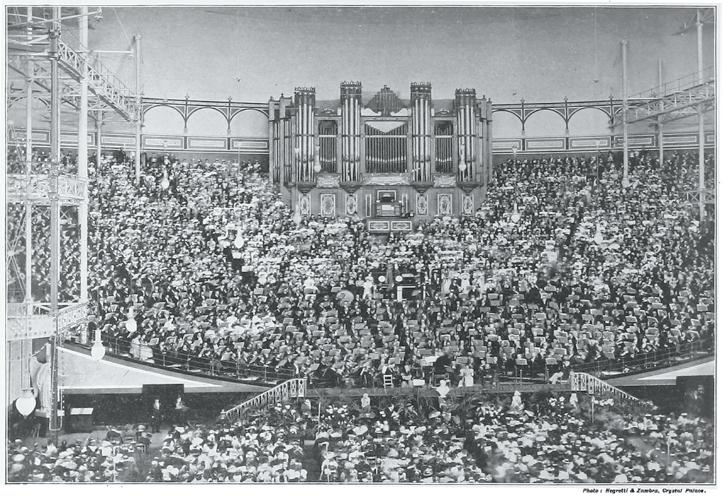
of both Italian opera and English oratorio, aiming to attract the enthusiasts for the two different forms of music drama. But during 1738, too few subscriptions were promised to secure the costly Italian stars that fashionable London expected for his operas, so Handel planned a whole season of English works. He opened with his new oratorio Saul, and then revived the moral odes Alexander’s Feast and Il trionfo del Tempo e della Verità. Normally he presented two new works in each season. The second in the 1739 season was Israel in Egypt. Handel aspired to be the nation’s prime composer, and Israel claims the ground of high national art. Handel’s contemporaries considered epic to be the noblest of genres and, more than any other Handel oratorio, Israel is an epic. The nation, represented by the chorus, is the main (human) character, and the subject-matter is a nation forging its destiny, overcoming its losses, settling its newly gained land, and assuming an
identity as a distinct community, all under the protection and guidance of its especial deity. Moreover, the faith of the hero-nation in Israel reflects the faith of its first audiences.
The Bible story of ‘Exodus’ (Part 1 of Israel) is for Christians a ‘type’ or foreshadowing of their redemption by Christ. Its text is part of the Anglican Easter liturgy. In this respect, Israel is the forerunner of Messiah: both works make the traditional connections between Old Testament texts and salvation by Christ, both defy contemporary Enlightenment sceptics by insisting on the truth of miracles, and both were written for Passiontide, which is when Handel always performed them. And Charles Jennens, who compiled the words of Messiah, probably also selected the texts of ‘Exodus’.
Handel may have not been interested in a more specific relevance of Israel to national salvation, but his audience was. In spring 1739, all England except the
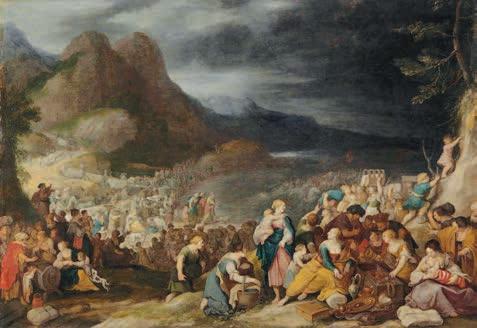 Handel Festival, Crystal Palace
Hans Jordaens III The Crossing of the Red Sea
Handel Festival, Crystal Palace
Hans Jordaens III The Crossing of the Red Sea
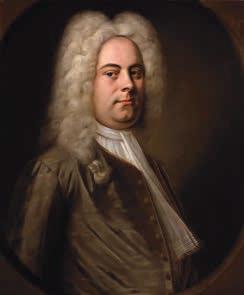
government wanted war with Spain. A press report of the second performance of Israel enlisted it as war propaganda, invoking the traditional parallel of ancient Israel and Protestant England (God’s chosen people then and now), and the topical parallel of Israel’s heathen enemies with the contemporary Catholic enemies of Britain. The demand was for a naval war, based on Britain’s supposed control of the sea, so the engulfing of the Egyptian land forces in the Red Sea was an encouraging image. A year later, the war now an unpleasant reality, the media piece was reprinted to coincide with Israel’s revival. To modern ears, the bass duet ‘The lord is a man of war’ may sound inaptly perky and overlong, but Handel’s audience would have heard ‘the chosen captains’ of Pharaoh as hostile Spanish mariners and the music’s mood as entirely appropriate (and the captains receive their solemn elegy immediately after: Handel is less populist than Arne was the following year with ‘Rule Britannia’).
Israel offers the listener a series of tremendous anthems. Handel’s audience agreed that the vivid, sublime, and divinely inspired verses of the Old Testament were perfectly matched by his vivid and sublime music, especially in his anthem style. What better text for Handel to set than the Ur-anthem, the Song of Moses (Part 2 of Israel). Moreover, the Song of Moses provided the most venerable, unassailable precedent not just for sung worship, but for choral, antiphonal, instrumentally accompanied cathedral music. Such music was still on the defensive from Puritan censure as being too complex, too ornate, insufficiently Protestant. The biblical account of the Song of Moses – double-choir, instrumentally accompanied – was cited by defenders of cathedral music to prove that God approved of exactly that species of music.
The antique authority that was claimed for cathedral music is a defining characteristic of Israel. Handel’s musical derivations here are mostly from composers of earlier centuries, and he leaves in place archaic-sounding harmony and rhythms. His self-quotations likewise sound ‘archaic’, for example the angular fugues conveying the Egyptians’ horror in ‘They loathed to drink of the river’ and ‘He smote all the first-born of Egypt’. Trombones, heard in eleven movements, were so antique in England in 1739 as to be obsolete; Handel probably used visiting German players. He gives the trombones a special identity in keeping with their antiquity and extraordinariness. They are the voice of the Ancient of Days, the Old Testament God.
To believers in Handel’s time, the story of the Exodus was one of the strongest ‘proofs’ of God’s miracles. Handel ‘enacts’ the plagues sent by God, but he also evokes the idea of God’s astonishing, inscrutable, unfathomable
numinousness. He strikes awe into the listener through unexpected harmonic transitions, especially to convey divine power (most astonishingly in ‘And in the greatness of thine excellency’), by firm block movement of voices and accompaniment, and by potent silences. A master of silence, Handel deploys it here to convey, variously, grief, shock, fear, suspense, contemplation, questioning, and awe.
© Bruno MoussierThe very fabric of the music varyingly renders ideas in sound. ‘The people shall hear and be afraid’ inculcates fear before any words are heard, with six bars of a brusque dotted motif, which pounds relentlessly through all but four of the next 60 bars as the Canaanites huddle together. Then they ‘melt away’, from eight massed voices to individual vocal lines, barely accompanied, marked piano just before the forte chordal acclaim (with hair-raising intervals) of God’s greatness, which reduces Canaan to inanition: lower voices, monotone, unaccompanied. And then, in an utterly changed mood of tenderness and serenity, God’s people pass over into safety, the bass pedal note giving their footing security, the vocal rising figure expressing their aspiration to be ‘thy people’, and the extension of the scalar motif in the bass vocal line from seven notes to twelve enlarging the numbers of the saved.
Handel drew his friends’ attention to his adventurousness. Katherine, Lady Knatchbull, relayed to her family that ‘He says the storm of thunder is to be bold and fine, & the thick silent darkness is to be express’d in a very particular piece of musick.’ These two movements follow each other (in the Bible their texts do not), giving Handel splendid scope for his favourite shaping device of contrast. The ‘particular’ harmonies of ‘He sent a thick darkness’ range in a mere 37 bars across keys with (implied) signatures from
six flats to five sharps: Handel sets up expectations which are constantly frustrated, so that the listener shares the Egyptians’ sense of not knowing how to find their way and, when they make a (tentative) move, not knowing where they are. And then the final chord proves to be a preparation for the first chord of the following chorus, which tells of the smiting of the first born: the effect is of a blow to the back of the neck, unexpected yet inevitable, and horrifically repeated, again and again, in the staccato string accompaniment.
Some of Handel’s ‘enactments’ are brilliantly and wittily illustrative, in vocal lines, instrumentation, texure, metre or all four: the hopping frogs (right up onto the royal bed ‘even in the king’s chamber’); the tormenting flies (you swat away the violins’ virtuosically buzzing demi-semi-quavers and back they come again); the innocently plopping raindrops turning to drumming hailstones; the drying up of the ‘rebuked’ Red Sea from eight vocal parts to four with a suspenseful awestruck silence between; the confusion of ‘the horse and his rider’ as the eight parts of the antiphonal choirs tumble together in the waves; the engulfing power of the overwhelming waters, timpani unmellowed by brass. This may be the nearest that eighteenthcentury London came to the experience of cinema.
Handel’s mimetic writing has a great range of sophistication: perhaps he was using different kinds of enactment for different types of listener in his audience, in order to impress as many as possible with the veracity of Scripture (and of course with his mastery of composition). Oratorio is often now described as opera of the mind, and in Israel more than any other, Handel engages our attention to contemplate God’s wonders and care.
George Frideric Handel by Balthasar Denner1. Recitative (tenor)
Now there arose a new king over Egypt, which knew not Joseph; and he set over Israel taskmasters to afflict them with burdens, and they made them serve with rigour.
(Exodus i: 8, 11, 13)
2. Alto Solo and Chorus
And the children of Israel sighed by reason of the bondage, and their cry came unto God. They oppressed them with burdens, and made them serve with rigour; and their cry came up unto God.
(Exodus ii: 23; Exodus. i: 13)
3. Recitative (tenor)
Then sent He Moses, His servant, and Aaron whom He had chosen; these shewed; His signs among them, and wonders in the land of Ham. He turned their waters into blood.
(Psalm cv: 26, 27, 29)
4. Chorus
They loathed to drink of the river. He turned their waters into blood.
(Exodus vii: 18; Psalm cv: 29)
5. Air (alto)
Their land brought forth frogs, yea, even in their king’s chambers.
(Psalm cv: 30)
He gave their cattle over to the pestilence; blotches and blains broke forth on man and beast.
(Exodus xi: 9, 10)
6. Chorus
He spake the word, and there came all manner of flies and lice in all quarters.He spake; and the locusts came without number, and devoured the fruits of the ground.
(Psalm cv: 31, 34, 35)
7. Chorus
He gave them hailstones for rain; fire mingled with the hail ran along upon the ground.
(Psalm cv: 3; Exodus 9: 23, 24)
8. Chorus
He sent a thick darkness over the land, even darkness which might be felt.
(Exodus x: 21)
9. Chorus
He smote all the first-born of Egypt, the chief of all their strength.
(Psalm cv: 36, 37)
14. Chorus
10. Chorus
But as for His people, He led them forth like sheep: He brought them out with silver and gold; there was not one feeble person among their tribes.
(Psalm lxxviii: 53; Psalm cv: 37)
11. Chorus
Egypt was glad when they departed, for the fear of them fell upon them.
12. Chorus
He rebuked the Red Sea, and it was dried up. He led them through the deep as through a wilderness.
(Psalm cvi: 9)
But the waters overwhelmed their enemies, there was not one of them left.
(Psalm cvi: 11)
13. Chorus
And Israel saw that great work that the Lord did upon the Egyptians; and the people feared the Lord, and believed the Lord and His servant Moses.
(Exodus xiv: 31)
Moses and the children of Israel sung this song unto the Lord, and spake, saying: I will sing unto the Lord, for He hath triumphed gloriously; the horse and his rider hath He thrown into the sea.
(Exodus xv: 1)
15. Duet (soprano 1 & 2)
The Lord is my strength and my song; He is become my salvation.
(Exodus xv: 2)
16. Chorus
He is my god, and I will prepare Him an habitation; my father’s God, and I will exalt Him.
(Exodus xv: 2)
17. Duet (bass 1 & 2)
The Lord is a man of war: Lord is His name. Pharaoh’s chariots and his host hath He cast into the sea; his chosen captains also are drowned in the Red Sea.
(Exodus xv: 3, 4)
18. Chorus
The depths have covered them: they sank into the bottom as a stone.
(Exodus xv: 5)
19. Chorus
Thy right hand, O Lord, is become glorious in power; Thy right hand, O Lord, hath dashed in pieces the enemy.
(Exodus xv: 6)
And in the greatness of Thine excellency Thou hast overthrown them that rose up against Thee. Thou sentest forth Thy wrath, which consumed them as stubble.
(Exodus xv: 7)
20. Chorus
And with the blast of Thy nostrils the waters were gathered together, the floods stood upright as an heap, and the depths were congealed in the heart of the sea.
(Exodus xv: 8)
21. Air (tenor)
The enemy said, I will pursue, I will overtake, I will divide the spoil; my lust shall be satisfied upon them; I will draw my sword, my hand shall destroy them.
(Exodus xv: 9)
23. Chorus
Who is like unto Thee, O Lord, among the gods. Who is like Thee, glorious in holiness, fearful in praises, doing wonders? Thou strechedst out Thy right hand, the earth swallowed them.
(Exodus xv: 11, 12)
24. Duet (alto and tenor)
Thou in Thy mercy hast led forth Thy people which Thou hast redeemed; Thou hast guided them in Thy strength unto Thy holy habitation.
(Exodus xv: 13)
25. Chorus
The people shall hear, and be afraid: sorrow shall take hold on them: all the inhabitants of Canaan shall melt away: by the greatness of Thy arm they shall be as still as a stone; till Thy people pass over, O Lord, which Thou hast purchased.
(Exodus xv: 14, 15, 16)
For the horse of Pharaoh went in with his chariots and with his horsemen into the sea, and the Lord brought again the waters of the sea upon them; but the children of Israel went on dry land in the midst of the sea.
(Exodus xv: 19)
The Lord shall reign for ever and ever.
(Exodus xv: 18)
And Miriam the prophetess, the sister of Aaron, took a timbrel in her hand; and all the women went out after her with timbrels and with dances. And Miriam answered them: —
(Exodus xv: 20, 21)
Sing ye to the Lord, for He hath triumphed gloriously; the horse and his rider hath He thrown into the sea.
(Exodus xv: 21)
22. Air (soprano)
Thou didst blow with the wind, the sea covered them; they sank as lead in the mighty waters.
(Exodus xv: 10)
26. Air (alto)
Thou shalt bring them in, and plant them in the mountain of Thine inheritance, in the place, O Lord, which Thou hast made for Thee to dwell in, in the Sanctuary, O Lord, which Thy hands have established.
(Exodus xv: 17)
The Lord shall reign for ever and ever.
(Exodus xv: 18)
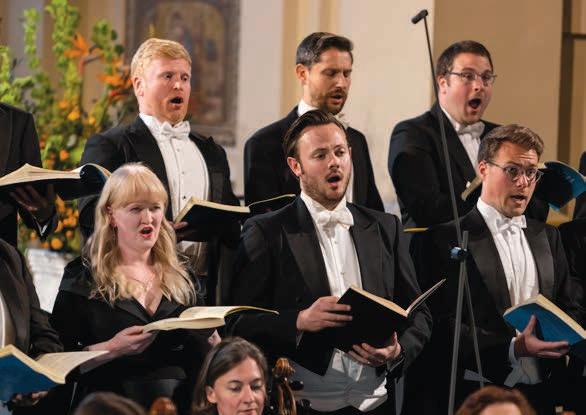 © Paul Marc Mitchell
© Paul Marc Mitchell
The Monteverdi Choir, founded in 1964, celebrates its 60th anniversary in 2024. Over the course of its life, it has established itself as one of the greatest choirs in the world. Through a combination of consummate technique, historically informed performance practice and a strong appreciation for visual impact, the Choir constantly strives to bring fresh perspectives, immediacy, and drama to its performances.
The Monteverdi Choir were proudly named ‘Best Choir’ at the Oper! Awards in January 2024. The Oper! Awards jury noted that “at festivals, on concert tours and in their numerous recordings, this is an ensemble whose quality will always leave the listener speechless. The singers have long since gone beyond the realm of their namesake and opera (co-)inventor, having moved well into the 19th century. Whether Baroque, the Classical period or the Romantic era, their singing is always unerringly tailored to the specific stylistic requirements. Again and again they have proven that, in addition to religious introspection, they are also masters of the grand operatic gesture, astounding us in Berlioz’s Les Troyens.”
The Monteverdi Choir’s 2024 season opened with a spectacular tour to Amsterdam’s Concertgebouw in February and March. Over three mesmerising concerts conducted by our Associate Conductor Dinis Sousa, the Choir captivated audiences and critics, and
the performances were met unanimously with 5-star reviews from the press, with Bachtrack calling them “truly one of the finest choirs of their time”.
Over the coming months, the Monteverdi Choir will embark on a dynamic programme of performances. In addition to their European tour of Handel’s Biblical oratorio Israel in Egypt in March and July, they will be joining the Orchestre Révolutionnaire et Romantique, conducted by Dinis Sousa, for performances of Beethoven’s Mass in C major and Symphony No. 9 at St Martin-in-the-Fields in London and the Philharmonie de Paris in May. In June, the Choir will perform Bach’s sacred motets in London and Leipzig; music which has been part of the Monteverdi Choir’s repertoire for over five decades, giving the Choir the opportunity to display technical virtuosity as well as a deep understanding of texts.
In 2023 the Monteverdi Choir and English Baroque Soloists, conducted
© Paul Marc Mitchell
by Dinis Sousa, performed Bach’s Mass in B minor, as well as Handel’s pastoral ode L’Allegro, il Penseroso ed il Moderato, on their American tour in October following their European tour of Bach’s monumental work in April. In the summer the Monteverdi Choir, Orchestre Révolutionnaire et Romantique and outstanding soloists, conducted by Dinis Sousa, performed Berlioz’s opera Les Troyens on a critically acclaimed European tour.
Founded in 1964 by Sir John Eliot Gardiner, the Monteverdi Choir has released over 150 recordings and won numerous prizes. The Choir and English Baroque Soloists were honoured to perform at the Coronation of its Patron, His Majesty King Charles III, in May 2023, with The Daily Telegraph proclaiming “if the Monteverdi Choir isn’t singing when I get to the gates of Heaven, I want my money back.”
St Martin-in-the-Fields
22 March 2024
Soprano
Rachel Allen
Emily Armour
Sam Cobb
Julia Doyle*
Eloise Irving
Laura Jarrell
Emily Owen
Alison Ponsford-Hill
Daisy Walford
Amy Wood*
Alto
Francesca Biliotti
Sarah Denbee
James Hall*
Iris Korfker
Simon Ponsford
Margarita Slepakova
Tenor
Jacob Ewens
Jonathan Hanley
Thomas Herford
Graham Neal
Nick Pritchard*
Benedict Quirke
Bass
Jack Comerford*
Tristan Hambleton*
Tom Herring
Alistair Ollerenshaw
David Stuart
George Vines
The English Baroque Soloists (EBS), founded in 1978 by Sir John Eliot Gardiner, seeks to challenge preconceptions of 200 years of music ranging from Monteverdi to Mozart and Haydn. Equally at home in chamber, symphonic and operatic performances, their distinctively warm and incisive playing is instantly recognisable.
One of the world’s leading period instrument orchestras, the ensemble has performed at many of the world’s most prestigious venues including Milan’s Teatro alla Scala, the Concertgebouw in Amsterdam and the Sydney Opera House.
The EBS will perform Handel’s biblical oratorio Israel in Egypt in March and July 2024, conducted by Peter Whelan. For this, they will join forces with the Monteverdi Choir, in its 60th anniversary season. As well as a performance at St Martin-in-the-Fields, London, this programme will be performed on tour, at the Palau de la Música, Barcelona, Philharmonie, Luxembourg, Chapelle Royale, Château de Versailles, Elbphilharmonie, Hamburg, and Haus für Mozart, Salzburg.
In 2023 the EBS and the Monteverdi Choir, conducted by Dinis Sousa, performed Bach’s Mass in B minor, as well as Handel’s pastoral ode L’Allegro, il Penseroso ed il Moderato, on their American tour in October following a European tour of Bach’s monumental work in April. In May the EBS and the
Monteverdi Choir were honoured to perform at the Coronation of Their Majesties King Charles III and Queen Camilla. In January 2023 the EBS were joined by Isabelle Faust and Antoine Tamestit for performances of orchestral works by Haydn and Mozart throughout Europe.
In 2022 the ensemble completed a number of successful tours including symphonies by Mozart and Haydn across Europe and the United States, and works by Bach, Schütz and Schein, in collaboration with the Monteverdi Choir, at prestigious festivals across Europe. The year culminated in a tour of J.S. Bach’s Christmas Oratorio, with the Monteverdi Choir, at Teatro alla Scala, Milan, Chapelle Royale, Château de Versailles, and at our London home,
St Martin-in-the-Fields, which was livestreamed on Deutsche Grammophon’s new online platform STAGE+.
The ensemble famously took part in the iconic Bach Cantata Pilgrimage in 2000 alongside the Monteverdi Choir, performing all of Bach’s sacred cantatas throughout Europe.
The EBS has also participated in major opera productions alongside the Choir in works by Handel, Purcell and Monteverdi, and recorded Mozart’s greatest operas for Deutsche Grammophon in the 1990s.
The English Baroque Soloists is under the patronage of HM King Charles III.
St Martin-in-the-Fields
22 March 2024
Violin I
Kati Debretzeni
Iona Davies
Madeleine Easton
Jane Gordon
Liz MacCarthy
Beatrice Scaldini
Violin II
Anne Schumann
Davina Clarke
Henrietta Wayne
Jean Paterson
Håkan Wikström
Anna Lester
Viola
Annette Isserlis
Lisa Cochrane
Mari Giske
George White
Cello
Kinga Gáborjáni*
Catherine Rimer
Ruth Alford
Poppy Walshaw
Double Bass
Valerie Botwright*
Cecelia Bruggemeyer
Flute
Rachel Beckett
Elizabeth Walker
Oboe
Michael Niesemann
Rachel Chaplin
Bassoon
Györgyi Farkas
Philip Turbett
Trumpet
Neil Brough
Robert Vanryne
Trombone
Matthew Lewis
Miguel Tantos
Sevillano
James Buckle
Timpani
Robert Kendell
Theorbo
Thomas Dunford*
Organ
James Johnstone*
Olivier award-winner Peter Whelan is among the most dynamic and versatile exponents of historical performance of his generation, with a remarkable career as a conductor and director. He is Artistic Director of the Irish Baroque Orchestra as well as Curator for Early Music of Norwegian Wind Ensemble. Peter is an acclaimed solo artist with an extensive and award-winning discography as a solo bassoonist.
As conductor, Peter has a particular passion for exploring and championing neglected music from the Baroque and Classical eras. Recent engagements have included appearances with English Concert, Scottish Chamber Orchestra, Beethoven Orchester Bonn, Netherlands Chamber Orchestre, Portland Baroque Orchestra, Lahti Symphony Orchestra, Oulu Symphony Orchestra and Orchestre de Chambre du Luxembourg.
The beginning of 22-23 season saw Peter conducting Vivaldi’s seldom performed Bajazet with Irish National Opera. This production was met with outstanding reviews and the production won an Olivier Award for ‘Outstanding Achievement in Opera’. In November/ December he made his debut at San Francisco Opera, conducting Gluck’s Orfeo ed Euridice. Other recent opera productions have included Marriage of Figaro, Magic Flute and Acis and Galatea with Irish National Opera and Handel’s Radamisto with English Touring Opera. Orchestral highlights of the 23-24 season include Orchestra of the Age of Enlightenment, Monteverdi Choir, English Baroque Soloists, Royal Northern
Sinfonia, Dunedin Consort, la festa musicale, Meininger Hofkapelle and Kristiansand Symphony Orchestra.
Peter returns to Irish National Opera to conduct a production of Vivaldi’s rarely performed l’Olimpiade in May 2024.
As founding Artistic Director of Ensemble Marsyas, Peter has performed at Edinburgh International, Lammermuir, Göttingen Handel, Kilkenny Arts, Tetbury, Bath and Great Music in Irish Houses festivals. During their 2020 Wigmore Hall residency, The Telegraph described Ensemble Marsyas as “very possibly this country’s finest period group – led by Peter, they perform with wonderful élan, transmitting their total enjoyment”.
Ensemble Marsyas has an impressive and award-winning discography with its disc of Barsanti being named Editor’s Choice in Gramophone Magazine in 2017 and “Recording of the Year” in MusicWeb International 2017, as well as reaching second place in the Official UK Specialist Classical Chart.
Peter’s artistic direction in live performance and the recording studio has been widely praised for its “rich insight, style and charisma” (Guardian), its “stylish verve” (BBC Music Magazine) and “phenomenally energetic direction” (Artsdesk). As a champion of early music, Peter represents “the very best of contemporary trends in bringing this music to life: flex and zest with tempi, lithe and vigorous … an incredible alertness to colors and moods summoned by the cut-and-thrust harmonic footwork of this music” (Operawire).
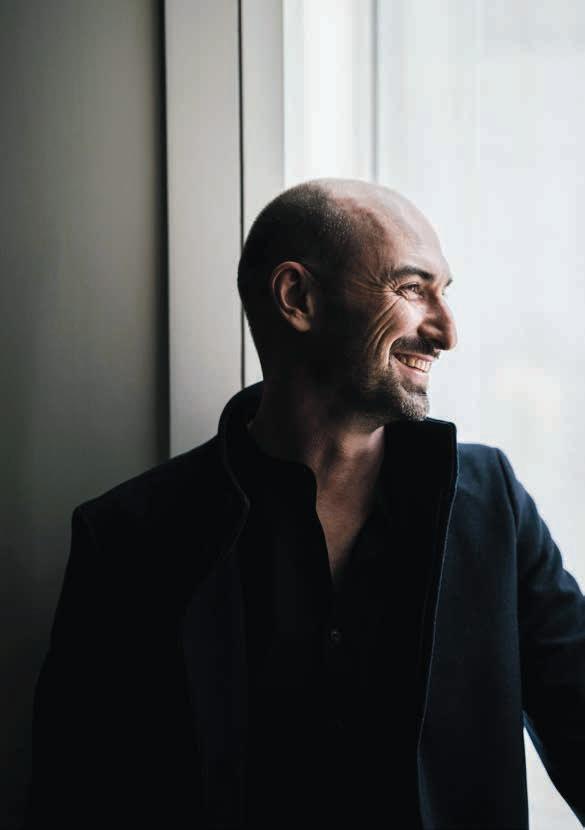 © Marco Borggreve
© Marco Borggreve


Born and educated in Lancaster, Julia read Social and Political Sciences alongside a Choral Scholarship at Cambridge. She made her professional début singing Messiah with the Britten Sinfonia / Polyphony at St John’s Smith Square. Since then, she has performed all over the world and is in demand as one of the world’s leading sopranos for Baroque repertoire.
Recent and future engagements include Mozart Mass in C Minor in Toronto with Tafelmusik, Vivaldi Juditha Triumphans at the Concertgebouw, Palace of Versailles and Theater an der Wien, Handel Aci, Galatea e Polifemo at Halle Handel Festival, various European tours with the Monteverdi Choir and Orchestras which has included a performance at the BBC Proms, Monteverdi with La Nuova Musica, Haydn songs with the Deutsche Kammerphilharmonie under Sir Roger Norrington, St Matthew Passion with the Orchestra of the Age of Enlightenment and the Bach Choir, recordings and concerts with the J.S. Bach Stiftung, Handel Occasional Oratorio with Bayerische Rundfunk, Bach arias for voice and violin with Vilde Frank and Arcangelo and a European tour of Messiah as well as a recording with the Rias Kammerchor. A busy recitalist, she works regularly with lutenist Matthew Wadsworth and their recording of Purcell has been received to critical acclaim.
Yorkshire-born soprano Amy Wood began singing as a chorister in Sheffield Cathedral Girls’ Choir, before going on to study Psychology at Manchester University.
Recent choral engagements have included Bach’s B Minor Mass and Handel’s L’Allegro in Carnegie Hall, a tour of Europe singing Bach’s Christmas Oratorio with Orchestra of the age of Enlightenment and Masaaki Suzuki, Berlioz’ Les Troyens at Salzburger Festspiele and the BBC Proms, and Brahms’ Requiem in Amsterdam with the Concertgebouw Orchestra. She also sang at the Coronation of HM King Charles III. This season, Amy’s solo engagements include Bach’s B Minor Mass, Couperin’s Leçons de ténèbres, Handel’s Messiah, Bach Motets in Leipzig and London, Mendelssohn’s Lobegesang with Andras Schiff and Beethoven 9 in Paris, Seoul and Taiwan.
Amy sings regularly with many of the top professional choirs in the UK, including the Monteverdi Choir, the BBC Singers, the Eric Whitacre Singers, La Nuova Musica, The Choir of the OAE, and she is a regular member of the Choir of the London Oratory. She has appeared on many film and TV soundtracks as a soloist and choir member, including Jurassic World and Fantastic Beasts and Where to Find Them. She also sang solo on the opening credits to Paul Verhoven’s latest film Benedetta and the BBC series Black Narcissus. Amy is a qualified psychotherapist and runs a busy private practice alongside her singing.

countertenor
Praised for his “outstanding” and “flawless” performances on opera, concert and theatre stages around the world, countertenor James Hall regularly appears with some of the world’s leading ensembles and opera companies. Current and future engagements include Bach’s B Minor Mass at the Bayerische Staatsoper München, Jan Matthijsz/Bisschop in The Apocalypse based on works by JS Bach with Opera2day, Lichas in Hercules for the Händel-Festspiele Karlsruhe, Strumpet Ginger in Purcell’s Masque of Might with Opera North, concerts with Dunedin Consort and RTÉ National Symphony Orchestra and Ottone (title role) and Andronico in Tamerlano with ETO. Past engagements include roles in Monteverdi’s Ulisse with the Maggio Musicale Fiorentino, Oberon in A Midsummer Night’s Dream for Deutsche Oper Berlin and Opéra National de Montpellier, The Boy in Written on Skin with the Venice Biennale, Goffredo and Mago Cristiano in Rinaldo with the Glyndebourne Festival and Glyndebourne on Tour, and Guildenstern in Hamlet with Glyndebourne on Tour. As Farinelli in Farinelli and the King he shared the stage with Oscar-winning actor Mark Rylance at the Belasco Theater on Broadway. He sang concerts with the Collegium Vocale Ghent, Scottish Chamber Orchestra, The English Concert, Royal Northern Sinfonia, Concerto Copenhagen, Singapore Symphony Orchestra, in venues such as Wigmore Hall, Carnegie Hall, Wiener Konzerthaus and Festival de Beaune, and appeared in concert with Sir George Benjamin to mark the composer’s 60th birthday at the Royal Festival Hall.


Nick Pritchard was an inaugural member of the Orchestra of the Age of Enlightenment’s (OAE) ’Rising Stars’ scheme and is a Samling artist. Described as a ‘Masterly Evangelist’ by The Guardian he has sung the role in Bach’s St John and Matthew Passions around the world. His recording of the St John Passion on Deutsche Grammophon was recently nominated for a Grammy Award. The 23/24 season highlights include a North American tour of Handel’s L’Allegro, il Penseroso ed il Moderato and Bach’s Mass in B minor with the Monteverdi Choir, performances with the Early Opera Company, Les Talens Lyriques Lully’s Atys at l’Opera Royal de Versailles and at the Vienna Konzerthaus, Evangelist with Irish Baroque under Peter Whelan, Residentie Orkest under Richard Egarr and Stavanger Symfoniorkester under Masato Suzuki, George Benjamin’s Written on Skin (John/ Angel 3) with the Finnish Radio Symphony conducted by the composer, Messiah with the Academy of Ancient Music and the Flemish Radio Choir and Britten’s St Nicolas at the Aldeburgh Festival. On the concert platform Nick Pritchard has performed with Ensemble Pygmalion, Concerto Köln, Les Talens Lyriques, Les Violons du Roy, L’Orchestre du Chambre de Paris, Orchestra of the Age of Enlightenment, English Concert, Early Opera Company, Philharmonia Orchestra, The Royal Philharmonic Orchestra, BBC National Orchestra of Wales, Gabrieli Consort, the Monteverdi Choir and Orchestras, and the Early Opera Company.
© Pablo Strong © Andrew Staples © Nick James © Louise O’Dwyer
Jack leads a varied career as a performer, teacher, and researcher. He read Music at the University of York and the Royal College of Music, where he graduated with a double First in Performance and Academic Research. Jack studied with Tim Evans-Jones and Stephen Varcoe.
Jack works regularly with the OAE, Gabrieli Consort & Players, The Sixteen, I Fagiolini and the Britten Sinfonia. Highlights have included tours of Gluck’s Orfeo and Iphigénie en Tauride with Laurence Cummings in Romania, Bach’s Motets at the BBC Proms with Harry Christophers, the Gramophone award winning Venetian Coronation programme with Paul McCreesh, Bach’s B Minor Mass in Poland with Vaclav Luks, Delius’s Hassan with Jamie Phillips, Beethoven’s Missa Solemnis at the BBC Proms with Sir John Eliot Gardiner and Handel’s L’Allegro with Dinis Sousa at Carnegie Hall. Recent solo engagements include BWV 174 with the London Handel Players, Schütz’s Musikalische Exequien with Sir John Eliot Gardiner and the Monteverdi Choir and Bach’s B Minor Mass with the Hanover Band. Jack works as a postgraduate researcher at the University of Southampton where he is completing a doctorate on eighteenth century private music-making and the arrangements of Handel’s oratorios. He is a recipient of the Handel Institute research award and recently appeared as a guest speaker on BBC Radio 3.

British bass-baritone Tristan Hambleton studied at St John’s College Cambridge, Heidelberg Universität and the Royal Academy of Music, London. He is an Equilibrium Young Artist for the 2023/24 season. His opera roles include Envy and High Priest in The Indian Queen with Emmanuelle Haïm and Le Concert d’Astrée at Opéra de Lille, Théâtre de Caen, De Vlaamse Opera and Grand Théâtre de Luxembourg; Priam in Les Troyens with the Orchestre
Révolutionnaire et Romantique at the BBC Proms; Marchese d’Obigny in La Traviata for Opéra de Bordeaux; Madman/Witness 3 in Lessons in Love and Violence with George Benjamin and the Mahler Chamber Orchestra; and Father Truelove in The Rake’s Progress with Barbara Hannigan and the Swedish Chamber Orchestra. Amongst his future engagements are Captain Ross in Stuart McRae Anthropocene at Landestheater Salzburg and the premiere of Edwin Baudo La Victoire de Karima with the Choeur de L’Orchestre de Paris. Tristan has also sung roles for Glyndebourne, Welsh National Opera, Festival d’Aix-en-Provence and Nevill Holt Opera.
On the concert platform Tristan has performed with The Hallé Orchestra, Royal Philharmonic Orchestra, the English Chamber Orchestra, Le Banquet Céleste, The Hanover Band, Orchestra of the Age of Enlightenment, Collegium Musicum Bergen and Ensemble Correspondances and with conductors Mark Elder, Nicholas Kraemer, Marc Minkowski, Dinis Sousa, Damien Guillon and Sébastien Daucé.
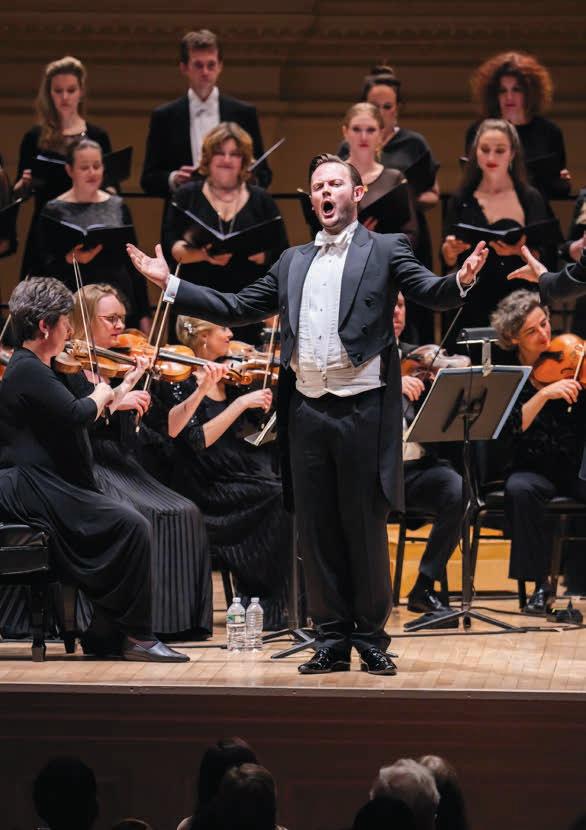 © Ben Durrant
© Pablo Strong
© Paul Marc Mitchell
© Ben Durrant
© Pablo Strong
© Paul Marc Mitchell
The three Monteverdi ensembles –the Monteverdi Choir, English Baroque Soloists and Orchestre Révolutionnaire et Romantique – are a leading force on the international music scene. World-class instrumentalists and singers of many different nationalities come together to perform in groundbreaking projects that span eight centuries of musical masterpieces, regularly performing at our central London home, St Martin-in-the-Fields.
As a registered charity without public subsidy, the Monteverdi Choir and Orchestras rely on the generosity of our supporters to continue planning our ambitious, historically inspired artistic programme. This support also allows us to share our concerts with music lovers around the world through top-quality film and audio content and helps us nurture and develop the next generation of musical talent.
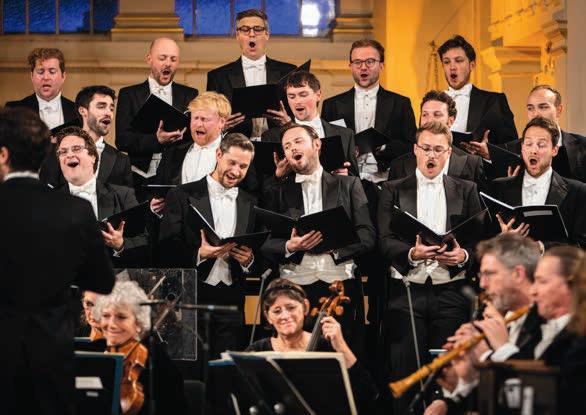
Our membership schemes start from £250 per year. Members enjoy a range of benefits including a personalised priority booking service for all our concerts, monthly newsletters, and invitations to post-concert receptions. At higher levels, additional benefits include invitations to exclusive open rehearsals, backstage access after our performances, and an Annual Conductor’s Dinner.
By supporting our charity at this highest level, you will contribute substantially towards our landmark projects, allow us to perform regularly in our London home at St Martin-inthe-Fields, and share our music globally via our filmed concerts.
We can offer creative and collaborative sponsorship packages that enable you to align your business with our work. There are opportunities to sponsor individual performances, or an entire season of concerts at our London home, St Martin-in-the-Fields.
By choosing to leave a Legacy Gift to the Monteverdi Choir & Orchestras, you will play a crucial role in ensuring that the performers and listeners of the future will continue to be enthralled by the power of our music-making.
Our American Friends play a valuable part in supporting and championing the work of the Monteverdi ensembles both in the US and beyond. The American Friends of the Monteverdi Choir & Orchestras, Inc is a registered 501(c)(3) and donations to the AFMCO are tax deductible for US taxpayers.
On our website, you will find the facility to make a donation (which we warmly welcome at any level), purchase one of our memberships for yourself, or treat a friend via a Gift Membership. If you would like to discuss how you could support us by becoming a Benefactor, or how your organisation could partner with us, please contact us to arrange a discussion with our General Director, Rosa Solinas.
development@monteverdi.org.uk
+44 (0)20 7719 0120
Monday to Friday 9:30am to 5.30pm
www.monteverdi.co.uk/support-us
© Paul Marc MitchellThe Monteverdi Apprentices Programme is a training scheme for young musicians that seeks to bridge the gap between higher education and the world of the professional musician. Participants in this long-established artist development programme take part in projects ranging from workshops and masterclasses to paid performances with the Monteverdi ensembles. With guidance from a team of dedicated mentors and guest workshops leaders, we aim to nurture and showcase the development of all our Apprentices by providing challenging and rewarding performance opportunities and exposing them to world-class coaching from experts in a range of fields.
The Monteverdi Apprentices Programme was set up in 2007 – the first of its kind in the UK – its aim being to nurture exceptional musical talent and an aptitude for ensemble performing. We felt there was a pressing need to create a safe environment and opportunity for gifted young singers and instrumentalists to dip their toes in the waters of professional music-making while still exploring their own musical potential. The Apprentices Programme follows the age-old apprenticeship principle of learning a craft on the job from older hands. At the start of the year, each Apprentice is assigned a mentor – an experienced musician within the Monteverdi Choir, EBS or ORR – on hand to give encouragement and one-to-one advice on the multiple challenges that arise from ensemble singing and playing at the highest professional level.
Over the course of their Apprentice year, these young musicians are integrated with the Monteverdi ensembles, rehearsing and performing in concerts at home and on tour overseas. Our aim is to round out their musical education and to help equip them for future challenges by giving them the opportunity to work alongside some of the best and most experienced musicians in the business; by the end of the year, we aim to have furnished these talented musicians with the skills to be able to work as professionals with the Monteverdi ensembles and other similar organisations worldwide. They will have been given a taste of the life of a professional musician and be in a better position to weigh up if this is genuinely the path that they wish to pursue either as a soloist, an ensemble musician, or both. The Programme now has over 90 alumni, and many Apprentices still perform regularly with the Monteverdi ensembles.
The ten 2023-24 Apprentices are Billie Robson, Theano Papadaki, Claire Ward, Lorna Price, Avalon Summerfield, Matthias Daehling, Joseph Taylor, Jack Harberd, Henry Saywell and George Vines; they are now nearing the end of their year-long programme; a year which has been as exciting as it has been varied.
In August, renowned tenor Jean-Paul Fouchécourt and French language
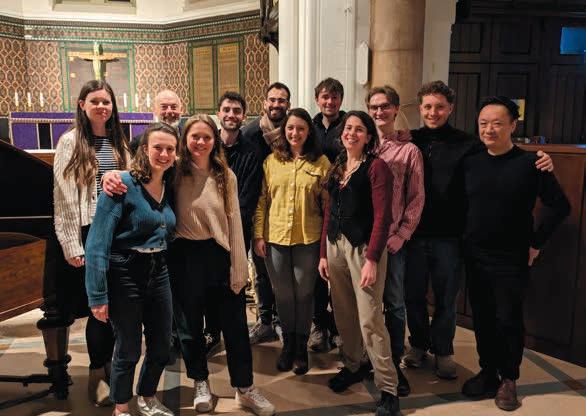
coach, Nicole Tibbels’ coaching stood the Apprentices in fine stead for MCO’s landmark European tour of Berlioz’s Les Troyens which conquered Festival Berlioz, Salzburg, Versailles, Berlin and the BBC Proms in September.
In October, Baroque soprano Sophie Daneman and conductor Dinis Sousa expertly guided the Apprentices through an array of Purcell solo and ensemble music across two days of insightful masterclasses, and in December, Italian language coach and musicologist Matteo delle Fratte, and James Halliday (MCO’s Librarian & Artistic Advisor) helped these young musicians bring Monteverdi’s madrigals to life.
Most recently, in February, Mark Padmore and Richard Stokes led two days of workshops on German Lieder,
complementing the Apprentices’ involvement with MCO’s performance of Brahms’s Ein deutsches Requiem with the Royal Concertgebouw Orchestra in Amsterdam.
With the 2023-24 Apprenticeship year drawing to a close, MCO are delighted to invite you to join our Apprentices for their Final Recital on Tuesday 16th April 2024; a sparkling evening of solo and ensemble vocal music in the atmospheric setting of the Crypt at St Martin-in-the-Fields. This showcase recital, accompanied by piano and lute, is the culmination of an intensive year of work by the current cohort of Monteverdi Apprentices, and more detail can be found on our website.
Monteverdi Apprentices with Mark Padmore and James Cheung, February 2024The Monteverdi Choir & Orchestras gratefully acknowledges the generous support of the following individuals, organisations and Trusts & Foundations:
HM King Charles III
Carol Grigor
Dunard Fund
Michael Beverley
David & Sandra Brierwood
Michael L. Cioffi
Christian & Myrto Rochat
Sir David Walker
David Best
Lord Burns
Morny Davison
Lord & Lady Deben
Sir Vernon Ellis
Lady Virginia Fraser
Andrey Kidel
William Lock
Sebastian & Flora Lyon
Francis Norton
Yoshi Onodera
Helen & John Skinner
Clare Woodman CBE
GOLD
Gordon Gullan
Stephen & Victoria Swift
SILVER
Julia & Martin Albrecht
Geoffrey Barnett
Donald & Corrine Brydon
Rosemary Chadder
Peter & Stephanie Chapman
The Earl & Countess of Chichester
Sarah Cuthbert
Sir Stephen Gomersall
Iain & Alicia Hasnip
Sir Henry Keswick
Yi-Peng Li
Lady Nixon
Mollie Norwich
Nicholas & Christylle Phillips
Professor Richard Portes CBE FBA
Anthony C. Shoults
Professor John Smyth
Captain Brian Woodford CBE RN
BRONZE
Tania Bader
Mary Bernard
Donald D. Campbell
Vanessa Claypole
Dr Carol Cobb
Steve Edge
Jonathan Edwards
Lady Egremont
Nigel Gibson
Anthony de Grey
Jenny Hill
Richard Jacques
Gareth & Charlotte Keene
Robert Moreland
Mary Pinnell
Daan Posthuma
Meghan Purvis
Anne Reyersbach
Thomas Richter
Dr Paul A. Sackin
Steven & Olivia Schaefer
Christopher J. H. Thornhill
Andrew Tusa
Andrew Wales
Jenny & John Wiggins
Morgan Stanley
Dunard Fund
The Prince of Wales’s Charitable Foundation
Garfield Weston Foundation
Mrs F B Laurence’s Charitable Trust
The Thistle Trust
Roger Chadder
Peter J. Chapman
Ian Hay Davison CBE
Judith McCartin Scheide
Nicholas Snowman OBE
The Estate of Howard Hodgkin
The Estate of Kevin Lavery
The Negaunee Foundation
Michael L. Cioffi
William Dudley
Neil Graham
David Kay
Seth Levi
Jai Shekhawat
Rory Walck
With grateful thanks to those who wish to remain anonymous and to the other individuals who give regular donations in support of our work.
MCO TEAM
Dr Rosa Solinas General Director
Martin Wheeler Finance & Administration Manager
James Halliday Artistic Advisor & Librarian
Emily Parker Artistic Operations Manager
Andrew Softley Artistic Projects & Choir Manager
Margot Moseley Tours & Concerts Manager
Matthew Knight Partnerships & Communications Manager
Freya Firth-Robson Fundraising Executive Assistant
Charlotte Marino Digital Operations Manager
Emily Denton Administrator
Philip Turbett Orchestra Fixer
Matthew Muller Stage Manager
Elephant Communications PR and media relations
Bonzo’s Consultancy Ltd Instrument Transport
Tom Cochrane Keyboard Technician (keyboards provided by Jennings Organs)
MCO BOARD OF DIRECTORS
Sir David Walker (Chairman)
Christian Rochat (Deputy Chairman)
David Best
Lady Deben
Virginia Fraser
Sir Stephen Gomersall
Andrey Kidel
Francis Norton
MONTEVERDI CHOIR & ORCHESTRAS
Level 12, 20 Bank Street, Canary Wharf, London E14 4AD, UK +44 (0)20 7719 0120 info@monteverdi.org.uk
Registered in England & Wales Company No. 01277513
Charity No. 272279
FOLLOW US ON SOCIAL MEDIA


Morgan Stanley is proud to support